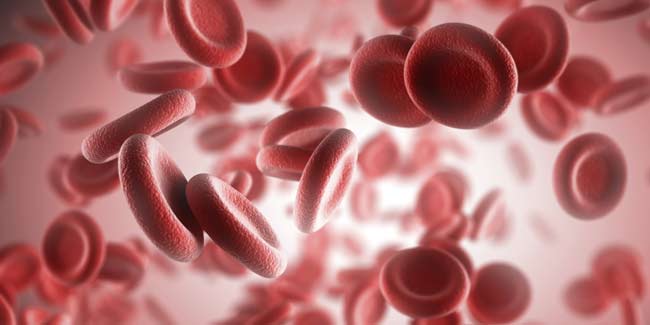Anemia is a general term for a large number of conditions marked
by a reduction in the oxygen-carrying capacity of blood. Red blood cells carry
oxygen in hemoglobin, so that anemia may be caused by a deficiency of blood or
red blood cells or of hemoglobin. These conditions may be caused by a variety
of other conditions. Injury can cause blood loss, which in turn can cause
anemia.

Nutritional deficiency, inadequate amounts of some of the vitamins
and minerals that are needed for hemoglobin production, may also cause anemia.
Because hemoglobin is the pigment that makes blood cells red, a lack of
hemoglobin will cause the cells to be a paler color, leading to the term hypochromic,
lacking in color.
Anemia caused by blood loss is normally treated with either blood
volume expanders such as plasma or with related blood products. More severe
blood loss may require transfusions of red blood cells.
In some cases, blood loss may be due to ulcers of the stomach or intestines. In these cases, treatment of the underlying cause will normally correct the anemia.
In some cases, blood loss may be due to ulcers of the stomach or intestines. In these cases, treatment of the underlying cause will normally correct the anemia.
The most common cause of anemia in adults is iron deficiency.
Although the typical American diet contains enough iron to meet normal needs,
individuals who are less able to absorb and store iron may experience
inadequate hemoglobin production. Although the best way to meet daily iron
requirements is through improved diet, iron supplements are widely used.
Antianemic drug, any drug that increases the number of red blood
cells or the amount of hemoglobin (an oxygen-carrying protein) in the blood,
deficiencies of which characterize the disorder known as anemia. The red cell
and hemoglobin reductions associated with anemia result in tissue oxygen
deficiencies that can lead to symptoms such as fainting, dizziness, and
shortness of breath.
There are different types of anemia, and thus there exists a
variety of antianemic agents. Iron salts, such as ferrous sulfate, are used to
treat iron-deficiency anemia, which occurs when the body is deficient in iron,
an essential component of hemoglobin. Folic acid and vitamin B12 are used to
treat folic acid deficiency anemia and pernicious anemia, which occur because
of a lack of these vitamins. Folic acid and vitamin B12 are necessary for red
blood cell formation.
An agent used to treat or to prevent anemia. Whole blood is transfused in the treatment of anemia resulting from acute blood loss, and packed cells are usually administered when the deficiency is caused by chronic blood loss. Transfusions of blood components are used in the treatment of aplastic anemia. Iron deficiency anemia is usually treated with oral preparations of ferrous sulfate, fumarate, or gluconate, but a parenteral preparation is indicated for people who are unable to absorb iron from the GI tract or for those who respond with nausea and diarrhea to the oral administration of iron.
Cyanocobalamin is administered parenterally in the treatment of
pernicious anemia. Folic acid is prescribed to correct a deficiency of that
vitamin in the anemias accompanying general malnutrition or Laënnec's cirrhosis
and to treat the anemia of infants on an exclusive milk diet. A combination of
folic acid and vitamin B12 is prescribed for people who are anemic as result
of an inadequate dietary intake of both vitamins.
PREPARATIONS
Iron
bivalent, oral preparations
Ferrous glycine sulfate, Ferrous
fumarate, Ferrous gluconate, Ferrous carbonate, Ferrous chloride, Ferrous
succinate, Ferrous sulfate, Ferrous tartrate, Ferrous aspartate, Ferrous
ascorbate, Ferrous iodine,
Iron
trivalent oral preparations
Ferric sodium citrate, Saccharated
iron oxide, Sodium feredetate, Ferric hydroxide, Ferric oxide polymaltose
complexes, Ferric citrate, Chondroitin sulfate-iron complex, Ferric acetyl transferring,
Ferric proteinsuccinylate, Iron dextran complexes
Iron
parenteral preparations, Iron in combination with folic acid
Ferrous amino acid complex, Ferrous
fumarate, Ferrous sulfate, Ferric oxide polymaltose complexes
Iron
in other combinations
Iron, vitamin B12 and folic acid,
Iron, multivitamins and folic acid, Iron and multivitamins, Iron, multivitamins
and minerals, Various combinations
Vitamin
B12 (cyanocobalamin and analogues) and folic acid
Cyanocobalamin, Cyanocobalamin
tannin complex, Hydroxocobalamin, Cobamamide, Mecobalamin, Cyanocobalamin,
combinations, Hydroxocobalamin, combinations
Folic
acid and derivatives
Folic acid, Folic acid,
combinations
Other
antianemic preparations
Erythropoietin, Darbepoetin alfa,
Methoxy polyethylene glycol-epoetin beta, Peginesatide
Sources
http://www.britannica.com/topic/antianemic-drug
http://medical-dictionary.thefreedictionary.com/Antianemia+Drugs
http://medical-dictionary.thefreedictionary.com/antianaemic

No comments:
Post a Comment